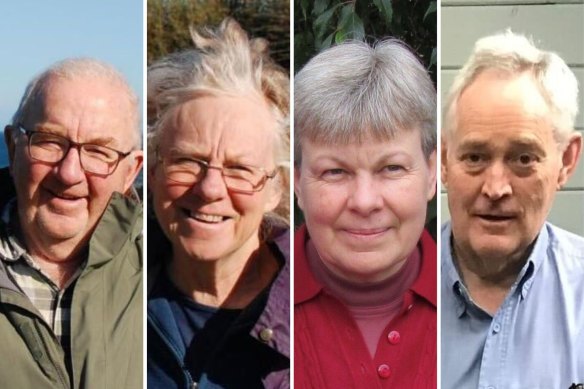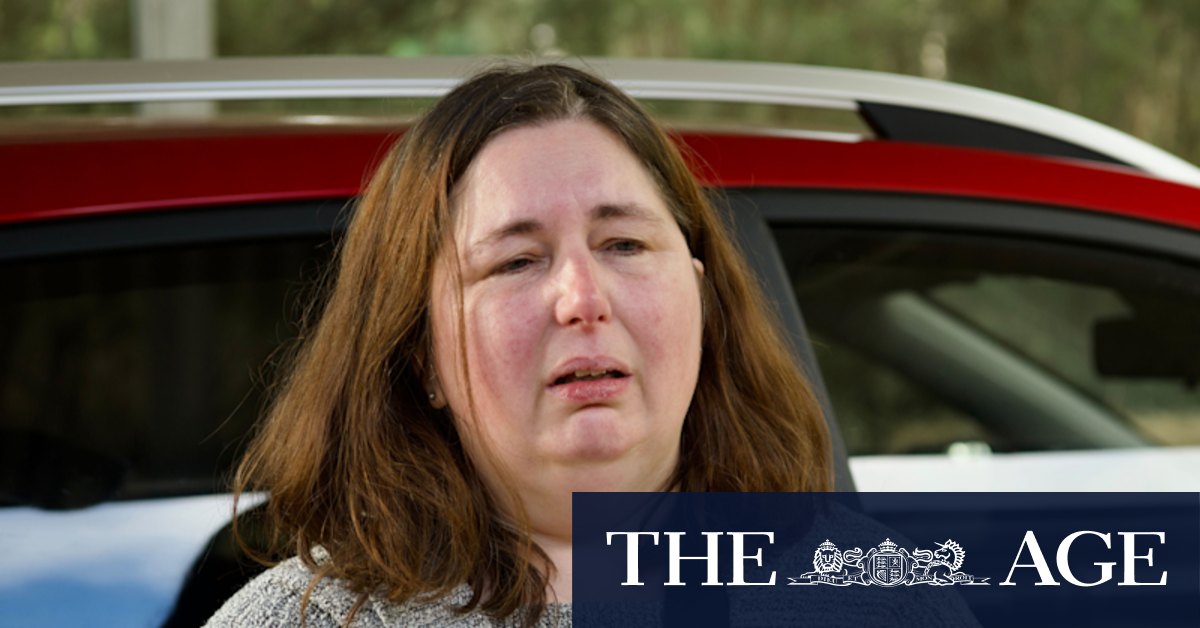The interview runs for barely 50 minutes (only 20 minutes was released to media by the Supreme Court), but it offers a glimpse into Patterson’s demeanour in the days immediately after the deadly meal, and exposes the web of lies she told the police in her attempt to get away with murder.
The COVID hobby
As the interview gets under way, Eppingstall makes clear the concerns of the investigators. They are worried about the source of the mushrooms Patterson put in the beef Wellington meal she served at her home on July 29, 2023.
“Is that something you’ve done in the past? Foraging for mushrooms?” Eppingstall asks.
Patterson shakes her head, looking at Eppingstall from across the table separating them.
“Never,” she says slowly.
Eppingstall asks again. Never?
“Never,” she says before looking away and blinking several times.
Patterson would later admit to the jury in her murder trial that this was a lie and that she had developed an interest in foraging wild mushrooms during COVID-19 lockdowns.
In court, she gave evidence that she first picked field and horse mushrooms growing in the paddock of a three-acre property she lived in at the time in Korumburra. She told the court she cut them up, fried them with butter and ate them.
“They tasted good and I didn’t get sick,” she told the court.
Foraging for mushrooms would become a key plank of her defence, as the mother of two told the trial that, in the fatal meal, she could have accidentally mixed wild mushrooms she had picked and dehydrated with dried mushrooms she bought from an Asian grocery store in Melbourne.
The dehydrator manual
As Eppingstall moves on to ask Patterson whether she preserves foods, “or anything like that”, Patterson shakes her head. She says she does not.
Loading
Eppingstall doesn’t press the issue, but as the interview continues, he asks Patterson about some items police have found at her house. Among those, there’s a manual for a Sunbeam dehydrator.
“Do you know anything about a dehydrator in your house?” Eppingstall asks.
“No,” Patterson responds, shaking her head as she looks at the detective.
“OK. Do you own a dehydrator?” Eppingstall asks.
Patterson says she doesn’t before pausing briefly and offering an explanation.
“I’ve got manuals of lots of stuff I’ve collected over the years. I’ve had all sorts of appliances and I just keep them all,” she says.
Asked by Eppingstall when she might have owned a dehydrator, Patterson contorts her face into a confused frown and shakes her head.
“I don’t know. I might have had one years ago,” she says.
“When I first got the Thermomix I got really excited about making everything from scratch, you know. And I did a lot of, um, you know, everything from scratch ingredients and I did a lot of that, so I could have had something like that back then.”
Loading
This, too, would prove to be a lie, as Patterson admitted during the trial that she went to a tip and dumped a dehydrator she bought in Leongatha about three months before the lunch, because she was scared people would think she deliberately poisoned guests.
During the trial, prosecutor Nanette Rogers, SC, told the jury Patterson bought the dehydrator two hours after cell phone data showed she had potentially visited a nature reserve in Loch where death cap mushrooms had been seen.
Rogers told the court Patterson’s visit to the reserve was part of her plan to seek out and locate death cap mushrooms, and then dehydrate, blitz and hide them in the individual beef Wellingtons she cooked for her guests.
Jurors were also shown images obtained from Patterson’s devices of dehydrated mushrooms sitting on the trays of the appliance, and CCTV footage of her dumping the dehydrator four days after the lunch, on August 2, 2023.
Great help or a wild goose chase?
In the police interview, as Eppingstall tells Patterson investigators are trying to understand what made her guests so ill, she looks down at the table and nods.
“Conversely, we are trying to understand why you’re not that ill,” Eppingstall adds.
“Hmm,” Patterson responds.
Asked by the homicide detective about whether she understands why she is being interviewed by the police, Patterson gets slightly agitated, almost confrontational.
“Yeah. I do. But I am sure you understand, too, that I’ve never been in a situation like this before, and I’ve been very, very helpful with the health department through the week because I wanted to help that side of things as much as possible because I do want to know what happened. So I’ve given them as much information as they’ve asked for and offered up all the food and all of the information about where the food came from,” Patterson says.
This is a line that Patterson would return to during the trial. But the prosecution painted a different picture for the jury.
The prosecution’s argument was that while Patterson’s lunch guests fought for their lives in the hospital, she sent the Department of Health on a wild goose chase to search 14 Asian grocery stores for any evidence of potentially contaminated batches of mushrooms. And how despite having worked and lived in the Monash City Council area years earlier and possessing a remarkable memory, she seemed unable to remember where exactly she bought the dried mushrooms used in the meal.
Unconditional love
As the interview moves on, Eppingstall tells Patterson he wants to understand why she invited her former partner Simon Patterson’s parents, and his uncle and aunt over for lunch.
“Because I have no other family,” she replies. “So they are the only support that I’ve got and they’ve always been really good to me. And I want to maintain those relationships with them despite what’s happened with Simon.”
Patterson looks at the table and adds: “I love them a lot. They’ve always been really good to me. And they always said to me that they would support me with love and emotional support even though Simon and I are separated. And I really appreciated that. Because my parents are both gone. My grandparents are all gone.”
She tells Eppingstall they are the only family she has, and the only grandparents her children have.
“I want them to stay in my kids’ lives. And that’s really important to me. And I think Simon hated that I still had a relationship with his parents. But I loved them,” she says.

From left: Don Patterson, Gail Patterson and Heather Wilkinson died after ingesting poisonous mushrooms. Ian Wilkinson is the sole-surviving lunch guest.
“Nothing that’s ever happened between us, nothing he’s ever done to me will change the fact that they’re good, decent people, that have never done anything wrong by me ever.”
Patterson does not appear overly emotional when speaking with the detective, even though in an interview she gave to reporters outside her home two days later, she appears overcome with grief.
Her messages to her Facebook friends, shown to the jury over the course of the trial, also paint a different picture.
In the messages, sent about a year before the lunch in the context of ongoing tension in the family over child support payments, Patterson describes her in-laws as a “lost cause” and says she wants “nothing to do with them”.
“F— them,” one of the messages read.
Start the day with a summary of the day’s most important and interesting stories, analysis and insights. Sign up for our Morning Edition newsletter.
